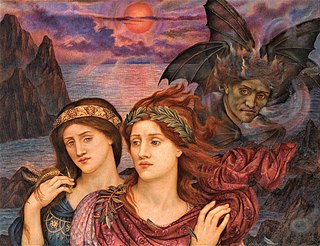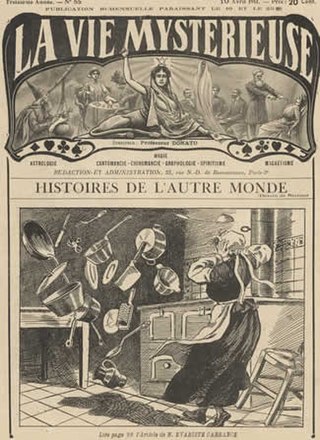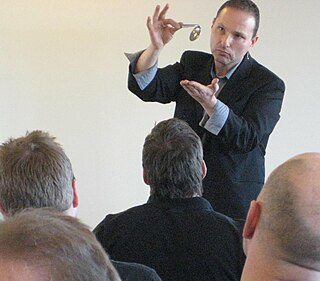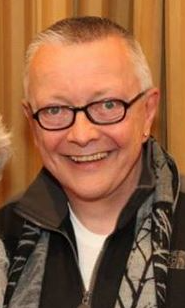Related Research Articles

Clairvoyance is the magical ability to gain information about an object, person, location, or physical event through extrasensory perception. Any person who is claimed to have such ability is said to be a clairvoyant.

Extrasensory perception or ESP, also called sixth sense, is a claimed paranormal ability pertaining to reception of information not gained through the recognized physical senses, but sensed with the mind. The term was adopted by Duke University psychologist J. B. Rhine to denote psychic abilities such as intuition, telepathy, psychometry, clairvoyance, clairaudience, clairsentience, empathy and their trans-temporal operation as precognition or retrocognition.

Parapsychology is the study of alleged psychic phenomena and other paranormal claims, for example, those related to near-death experiences, synchronicity, apparitional experiences, etc. Criticized as being a pseudoscience, the majority of mainstream scientists reject it. Parapsychology has also been criticised by mainstream critics for many of its practitioners claiming that their studies are plausible in spite of there being no convincing evidence for the existence of any psychic phenomena after more than a century of research.

In ghostlore, a poltergeist is a type of ghost or spirit that is responsible for physical disturbances, such as loud noises and objects being moved or destroyed. Most claims or fictional descriptions of poltergeists show them as being capable of pinching, biting, hitting, and tripping people. They are also depicted as capable of the movement or levitation of objects such as furniture and cutlery, or noises such as knocking on doors. Foul smells are also associated with poltergeist occurrences, as well as spontaneous fires and different electrical issues such as flickering lights.

Zener cards are cards used to conduct experiments for extrasensory perception (ESP). Perceptual psychologist Karl Zener (1903–1964) designed the cards in the early 1930s for experiments conducted with his colleague, parapsychologist J. B. Rhine (1895–1980). The original series of experiments have been discredited and replication has proven elusive.
A psychic detective is a person who investigates crimes by using purported paranormal psychic abilities. Examples have included postcognition, psychometry, telepathy, dowsing, clairvoyance, and remote viewing. In murder cases, psychic detectives may purport to be in communication with the spirits of the murder victims.
Zé Arigó was a faith healer and proponent of psychic surgery. He claimed to have performed psychic surgery with his hands or with simple kitchen utensils while in a mediumistic trance, therefore he was also known as the Surgeon of the Rusty Knife. During his operations he supposedly embodied the spirit of Dr. Adolf Fritz.
Psychometry, also known as token-object reading, or psychoscopy, is a form of extrasensory perception characterized by the claimed ability to make relevant associations from an object of unknown history by making physical contact with that object. Supporters assert that an object may have an energy field that transfers knowledge regarding that object's history.

Spoon bending is the deformation of objects, especially metal cutlery, purportedly by paranormal means. It is a common theme for magic tricks, which use a variety of methods to produce the effect. Performers commonly use misdirection to draw their audience's attention away while the spoon is manually bent. Another method uses a metal spoon that has been prepared by repeatedly bending the spoon back and forth, weakening the material. Applying light pressure will then cause it to bend or break.

The Enfield poltergeist was a claim of supernatural activity at 284 Green Street, a council house in Brimsdown, Enfield, London, England, United Kingdom, between 1977 and 1979. The alleged poltergeist activity centred around sisters Janet (11) and Margaret Hodgson (13). Some members of the Society for Psychical Research (SPR), such as inventor Maurice Grosse and writer Guy Lyon Playfair, believed the haunting to be genuine, while others such as Anita Gregory and John Beloff were "unconvinced" and found evidence the girls had faked incidents for the benefit of journalists. Members of the Committee for the Scientific Investigation of Claims of the Paranormal (CSICOP), including stage magicians such as Milbourne Christopher and Joe Nickell, criticized paranormal investigators for being credulous whilst also identifying elements of the case as being indicative of a hoax.

William G. Roll was an American psychologist and parapsychologist on the faculty of the Psychology Department of the University of West Georgia in Carrollton, Georgia. Roll is most notable for his belief in poltergeist activity. He coined the term "recurrent spontaneous psychokinesis" (RSPK) to explain poltergeist cases. However, RSPK was never accepted by mainstream science and skeptics have described Roll as a credulous investigator.

Milbourne Christopher was a prominent American illusionist, magic historian, and author.

Theodore Judd Serios was a Chicago bellhop known for his production of "thoughtographs" on Polaroid film. He claimed these were produced using psychic powers. Serios's psychic claims were bolstered by the endorsement of a Denver-based psychiatrist, Jule Eisenbud (1908–1999), who published a book named The World of Ted Serios: "Thoughtographic" Studies of an Extraordinary Mind (1967) arguing that Serios's purported psychic abilities were genuine. However, professional photographers and skeptics have argued that Serios and his photographs were fraudulent.

Thoughtography, also called projected thermography,psychic photography,nengraphy, and nensha(Japanese: 念写), is the claimed ability to "burn" images from one's mind onto surfaces such as photographic film by parapsychic means. While the term "thoughtography" has been in the English lexicon since 1913, the more recent term "projected thermography" is a neologism popularized in the 2002 American film The Ring, a remake of the 1998 Japanese horror film Ring.
Joe Nickell is an American skeptic and investigator of the paranormal.

Flim-Flam! Psychics, ESP, Unicorns, and Other Delusions is a 1980 book by magician and skeptic James Randi about paranormal, occult, and pseudoscience claims. The foreword is by science fiction author Isaac Asimov. Randi explores topics which he says that scientists and the media are too willing to promote without skepticism and proper expertise.
A pet psychic is a person who claims to communicate by psychic means with animals, either living or dead. The term psychic refers to the claimed ability to perceive information unavailable to the normal senses by what is claimed to be extrasensory perception. It is the opinion of scientific skeptics that people believe in such abilities due to cognitive biases and the use of various techniques by the practitioners, including intentional deception.

Chip Coffey is an American self-proclaimed psychic from Elmira, New York, currently living in Atlanta, Georgia. He appeared as a medium on various paranormal television programs, primarily Paranormal State and Psychic Kids. On Psychic Kids he acts as a mentor towards children who claim to have psychic abilities, primarily seeing ghosts. Coffey's claims of being able to communicate with the dead have been subject to criticism by skeptics. In 2019 it was announced that Coffey will be joining Travel Channel's Kindred Spirits as the third official cast member alongside Adam Berry and Amy Bruni for the fourth season in 2020.

Psychokinesis, or telekinesis, is a hypothetical psychic ability allowing a person to influence a physical system without physical interaction.

Charles Edward Mark Hansel was a British psychologist most notable for his criticism of parapsychological studies.
References
- ↑ Lippard, Jim. "Publications and Appearances" (bibliography). discord.org. Accessed July 13, 2009. Archived from the original.
- ↑ "James Joseph Lippard" . Retrieved 2009-07-13.
- ↑ Marsan, Carolyn Duffy (October 28, 2002). "DDoS attack highlights 'Net problems". Network World . Vol. 19, no. 43. IDG. p. 12. Retrieved August 9, 2009.
- ↑ "The Fabulous Prophecies of the Messiah". Infidels.org. Retrieved 2009-07-13.
- ↑ Ed Babinski. "Leaving the Fold and Young Earth Creationism" . Retrieved 2009-07-13.
- ↑ Joe Nickell. "Psychic Sleuths: ESP and Sensational Cases". Prometheus Books. Archived from the original on 2009-05-26. Retrieved 2009-07-13.
- ↑ Gordon Stein (1996). The Encyclopedia of the Paranormal. New York: Prometheus Books. ISBN 1-57392-021-5.
- ↑ "Scientology v. the Internet: Free Speech and Copyright on the Information Superhighway". Skeptic. Skeptics Society. 3 (3): 35–41. 1995. Retrieved 2010-01-21.
- ↑ "Jim Lippard homepage" . Retrieved 2009-07-13.
- ↑ "Homeland (TV Series) | Useful Idiot (2018) | James Lloyd Reynolds: Jim Lippard."(Season 7, Episode 9). IMDb . Accessed May 7, 2021. Archived from the original.